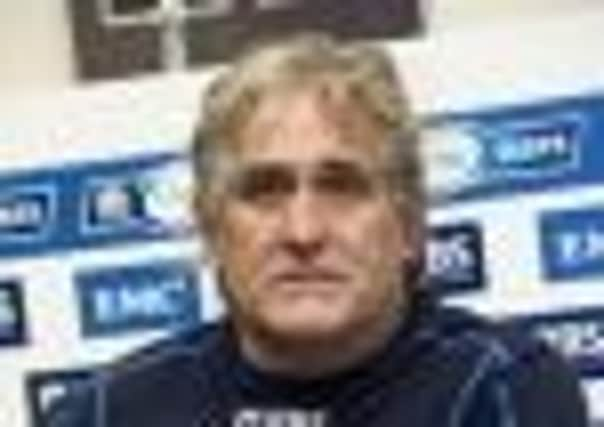Alan Massie: 1872 Cup sides offer slim pickings for Johnson


The truth is that it’s easy to exaggerate the difference a coach may make. The most successful coaches coach good teams, but the extent to which they make a team good is open to question. Ian McGeechan, with the help of Jim Telfer, masterminded our 1990 Grand Slam, but he was much less successful when he returned to coach Scotland in 2000. The 2003 World Cup, when Telfer was at his side, came close to being a disaster. Was this his fault? Or did he simply have better players in 1990 than he did later?
Now we have Scott Johnson as interim coach. His record – and his reputation as a maverick – may lead one to think him better suited to the role of assistant. We shall see. Results are, however, as likely to depend on his selections as on anything he may say. One hopes he doesn’t bore the players rigid as Matt Williams, the other Australian to have been Scotland‘s coach, is said to have done.
Advertisement
Hide AdAdvertisement
Hide AdThe two games for the 1872 Cup are seen by some as the equivalent of the old National Trial matches in the amateur days. The comparison is specious. First, there is genuine needle and something to play for other than personal reputation and an international cap. These are league and cup matches between clubs; more than bragging rights are at stake. The Trial teams were scratch selections, even if the Blues or Scotland side usually bore a close resemblance to the XV that had finished the previous season’s Five Nations. But in the days when autumn internationals were rare, it might be the first time that side had come together since March. Then the selectors were apt to reshuffle the sides at half-time. This made coherence difficult and was as likely to confuse issues as to clarify them.
There is another difference. Whatever the artificiality of the Trial, the Scotland XV for the first international a couple of weeks later was generally drawn from the 30 (or sometimes more) players who featured in it, the only exception being an established international who missed the trial on account of injury but was fit for the international match. Now a third of the likely international squad play their club rugby out of Scotland. So the Glasgow-Edinburgh games are in one sense more than the old Trial, in that they are genuinely competitive, and in another sense less than it.
Very few players can be certain that they will be picked for the Calcutta Cup match on 2 February. This is the natural consequence of too many defeats. Of those who started last night, perhaps only Tim Visser and Ryan Grant can be sure they will be lining up when the ball is kicked off at Twickenham; and, of the Exiles or missing, only Euan Murray and Richie Gray are certainties, with Kelly Brown, Mike Blair and Jim Hamilton probables.
In picking their teams for last night’s game, Gregor Townsend and Michael Bradley haven’t gone out of their way to help the new Scotland coach. Townsend left Stuart Hogg and Henry Pyrgos on the bench, with Peter Murchie at full-back and Niki Matawalu at scrum-half. Bradley named Greig Laidlaw, fly-half in the last 11 internationals in his old position of scrum-half, with the English/New Zealander Piers Francis outside him. So two of the four halves are not eligible to play for Scotland. One can’t blame the coaches. Each picked a side to win the game.
Hogg’s relegation to the bench is more disappointing than surprising. Though he has been sound under the high ball and has developed a mighty boot, he has lacked the spark that made him so exciting last spring. He has bulked up considerably, and seems to have lost, one hopes only temporarily, a bit of pace; he also seems less nimble-footed. Nevertheless it would a surprise if he isn’t our full-back at Twickenham.
Everyone accepts that the Scottish pack is capable of at least holding its own against anyone, even if there are difficult selection decisions to be made at hooker, in one lock position, and in the back-row where the problem is getting the balance right. Our back three too look okay, no matter which of several candidates is on the right wing. It’s 9, 10, 12 and 13 that pose the problem. Laidlaw’s future may be at 9 rather than 10, but I still think Mike Blair our best-scrum-half, certainly the best organiser of his forwards, the best cover tackler and the best defender under the high ball. Given that we are likely to be doing a lot of defending, it would be rash to discard him.
Ever since I saw him play international age-group rugby, Ruaridh Jackson has seemed to have the potential to be an outstanding fly-half. The potential is still there, but it is time it was realised. Centre, however, is the real problem. We haven’t had a good 12-13 combination since John Leslie and Alan Tait were together in 1999, and we won’t win consistently till we get one. I’m not sure that the outlook is getting any brighter. There have been glimmerings from Nick De Luca and Matt Scott, but glimmerings aren’t good enough. Yet they may still be the best pair available.
Finally, I trust that, no matter how he performs in the two cup games, the Scottish New Zealander Sean Maitland won’t be rushed into the national side. He is here because he has given up hope of being an All Black, and should earn his place over more than a handful of matches.